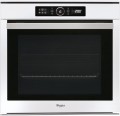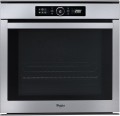Number of modes
The number of cooking modes provided in the design of the oven. In this case, the cooking mode means the general opertaion mode — for example, “heating”, “heating + convection”, etc. Accordingly, this indicator strongly depends on additional equipment (see "Features"). However, even in similar models, the number of modes may be different. In general, the
more cooking modes, the more cooking options, the easier it will be to choose the optimal mode for a specific situation.
Number of automatic programmes
The number of preinstalled cooking programmes stored in the oven's memory — usually designed for a specific dish or just
a defrost mode. If you have the appropriate programme, you do not have to keep track of the time, manually change the temperature and rearrange the dish in the oven — just put the ingredients there and start the programme, and the device will do the rest on its own. At the same time, unlike individual cooking modes (see above), the programmes are more complex — they provide changing temperatures, turning on special modes, turning off when time has elapsed, etc. The larger the set of automatic programmes, the wider the possibilities of the oven; their number in modern models can be in the tens. On the other hand, such programmes cannot be changed at will, so if you need both creativity and maximum convenience, you should pay attention to models with the ability to record
custom programme in memory.
Number of door glasses
The number of layers of glass in the viewing window of the oven door.
Modern models, usually, have from 2 to 4 glasses. The
more glasses, the less heat loss and the more economical the oven, but this parameter also affects the cost.
Oven cleaning
The type of inner cleaning provided in the oven. Note that pollution has to be removed with a rag or sponge, but modern ovens often provide various tricks that facilitate the process. The options might be:
—
Catalytic. A special wall coating is used in ovens with this cleaning method: it breaks down fats and other stubborn dirt into constituent elements that can be easily removed. The effectiveness of such a coating decreases over time, but it is enough for at least several years of full use. It should be noted that the catalytic coating can be implemented by applying it to special removable plates that are installed on the back or side walls of the oven chamber.
—
Steam cleaning. Cleaning with hot steam, which softens dried-on dirt and partially breaks down fats. In some models, there is a built-in steam generator for this, in others it is enough to put a container of water in the working chamber and turn on the cleaning program.
—
Pyrolytic. Cleaning by heating the chamber to a very high temperature — about 500 ° C. At this temperature, most of the contaminants are incinerated into ash, which can then be easily removed. Pyrolytic cleaning is considered the most effective, but ovens with this function are expensive, time consuming, require significant electricity/gas consumption, and can lead to unpleasant odors.

